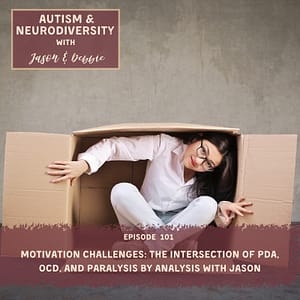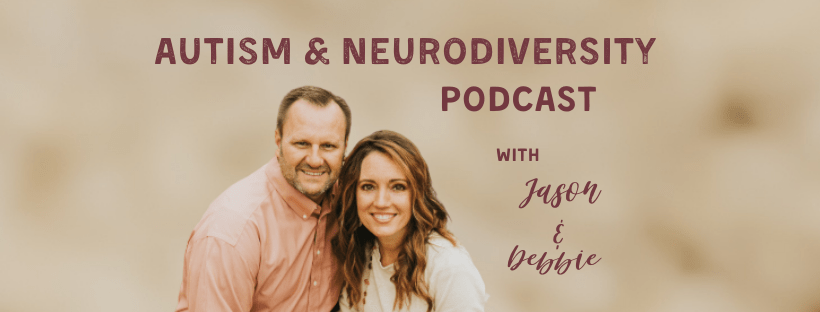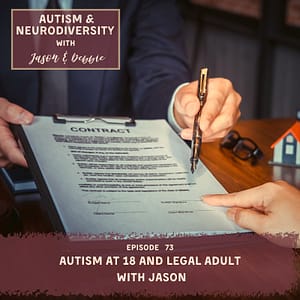[00:03] Jason: Welcome to the Autism and Neurodiversity podcast.
[00:06] Debbie: We’re here to bring you helpful information from leading experts and give you effective tools and support. I’m Jason Grygla, a licensed counselor and founder of Techie for Life, a specialized mentoring program for neurodiverse young adults.
[00:19] Jason: And I’m Debbie Grygla, a certified life coach. And maybe most importantly, we’re also parents to our own atypical Young Adults.
[00:30] Jason:
Hello, welcome to the Autism and Neurodiversity podcast. I’m Jason Grygla, and I’d like to talk to you today about something that is fairly common, that most of you won’t know, that you need to traverse as your young adult nears the age of 18.
So what happens is we know that their timelines are typically different, lower, delayed, and that they typically don’t hit their stride or catch up to their level of adulting until their mid 20s, sometimes earlier, sometimes later. And so they have time on their side, which isn’t necessarily comforting to parents, because that just means longer. And I want you to know that that’s what you’re up against so that you can pace yourself now.
And because they’re nearing the age of 18, we kind of assume, and their teachers assume, and their therapists assume, and society at large assumes, that once they hit 18, they have a right to make all of their own decisions.
And they’re correct unless you get power of attorney because you have them sign a paper that says that they want you to be their guardian, or you can get a judge to order it even against your loved ones wishes, and you take control over their situation. There are benefits to that. I think it can protect them financially if you have guardianship so that they can’t sign contracts, including credit cards and purchasing things.
And I had one parent whose child went out and went to a used car lot, spent way too much money on a car, and gave them the $3,000 cash that he had as a down payment, and it was a piece of junk. And we were able to go back in and say, we knew something was different about this young man when he came in, and you still did what you did. And so we were able to get that deal canceled and returned the car, which was a huge relief to even the young adult that purchased the vehicle.
But as you know, here’s the problem. You’re still dealing with someone who might be making the decisions of a young teen, even an adolescent in some ways, and they’re not thinking straight. They’re not thinking about the future. They’re not seeing all the consequences. They haven’t had much life experience. They’re not savvy. They can be taken advantage of.
And because they’re 18, one, society expects them to make their own decisions, and two, they expect to make their own decisions. And with all teenagers and neurodiverse or neurodivergent, young adults aren’t any different. They want to make adult decisions, whether they’re ready for it, or not. Ready or not, here I come.
And developmentally speaking, teenagers brains that are so underdeveloped and have spread themselves out to grow way too fast and their depth of thinking and neural pathways has not put up through their sprawling brain growth in their teenage years.
They demand to be treated like adults, and they haven’t earned it, and it’s okay. And if we give them privileges and responsibilities and we trust them to become capable of those things, there’s a pretty good balance there between I’m not going to let them die if I really know that they’re not safe to drive.
At the same time. None of us were safe to drive, but we thought we were, and we had to do that balance between how do I become safe to drive without driving or waiting until I’m safe to drive before I drive and then never getting to drive as an example.
So I think most teenagers need to be trusted as adults and given the opportunity to fail and practice as long as it doesn’t destroy their lives or destroy the lives of others, including us.
As the parents enter a disability. And I don’t want to spend any time talking about whether their neurodivergent brain is a disability or not. All I know is that most of the ability of our loved one who has a different type of brain, most of them struggle with mature, safe, healthy decisions, and they can get into more trouble than someone else their age because of this magical number of 18 that we set in society a long time ago.
And the reality is, the statistics are changing for when students or when our children are leaving the home. They’re leaving older and older. They’re living at home longer. They’re graduating from college longer than four years. They’re getting married older. They’re having children older. They’re finding their career path older. That age of 18 socially no longer fits. It’s probably around 21 now, from a generation or two ago.
I was working at age 14. I don’t know many kids these days that are working at 14. I was bussing tables in the summer. I had two jobs. I was doing a paper route, and I was bussing tables at a Mexican food restaurant even at age 14. And maybe that’s not that normal, but there was a lot of people I knew that were doing similar things.
So having said that, here we are as parents now with our neurodivergent loved one. They turn 18, they’re saying, Screw you, I’m going to do what I want, or you can’t tell me what I can and can’t do. But they’re still acting like a 14, 15 year old. My first advice in that situation is, one, you need to protect them from themselves. If they were 15 years old, you would protect them from themselves if they’re 20, but they act like they’re 14, you protect them as if they were 14. And if that makes you their enemy. You’ll have to balance that, because if you lose the ability to influence their lives completely, and then they really get destroyed, taken advantage of, and that’s not helpful either.
But when it comes to you advocating for anything outside of the home, you go in and advocate for your 14 year old developmental child who is actually chronologically older or old enough to make their own decisions. I have never actually seen somebody push back really hard on a proactive parent unless they were legally mandated to, like, if they go to the Er.
But even in the Er, I’ve been really surprised if I go with someone and I say, hey, I’m here with so and so, they’re on the spectrum, or they have a neurodivergent brain that is developmentally delayed, and I’m here to mentor them, or I’m their therapist, or I’m their friend, I’ve never seen a doctor say, I can’t talk to you at all. What I have seen them do is lean over to the student who is maybe the client, say, hey, this is so and so. It’s cool if they’re here, right? And most of them get it because they don’t want to be dealing with somebody who doesn’t have their developmental capacity in place.
Some doctors aren’t that way. Some are really stuck on that age 18, and I would advocate and say they have a disability. If you don’t allow me to be a part of this, you’re going to do poor treatment. You’re not going to get the results you want. It’s way more likely that you’ll be liable for problems and errors if I’m not a part of it. But it’s up to you. So advocate and let them know that it’s in their best interest to let you come and be a part of it.
It can get tricky. I know that for my son Lee, we would go to IAP meetings and they would speak to him as if he was 18, when he was 18, and give him responsibilities and choices about his future, that there was just no way he should have been thinking about nothing. He should have been thinking about it. He should not have been making those decisions. They wanted him to graduate early, for example. We’re like, no, keep him in the nest as long as we can because the services cliff comes if he graduates early. So we got him on the five year plan for high school, which was really good for him.
So I think it’s wise as much as you can to not get intimidated by this age 18. They get to make their own decisions, and I have to just keep supporting them, financially, emotionally, physically. I have to feed them, do their laundry, and do everything for them, but they get to act like they’re adults who can’t provide for themselves. I don’t think that’s good for yourself, and it’s not good for your loved ones.
So as much as you can advocate as a parent until they are developmentally ready to advocate for themselves as a general rule. And I wouldn’t be shy about it. I was apprehensive. I was a little squeamish to push that. And now I look back and I think I was afraid because I didn’t know better.
And what I knew my son needed was different than what my son thought he needed at 18. It’s like a 14 year old saying, I don’t need high school, so I’m dropping out. So I kind of know better. And not because I’m all about just getting the diploma, but I need him to have that development and that experience, and I need him out of the house, and he needs those things too. But I needed it, right? And it’s easy for them to make decisions that are going to cause us as parents a lot of crises.
So I want to advocate for you to advocate for your child, and don’t be afraid to do that, even if they’re 18 or older. And I want you to go in and just be confident about, I’m here because my loved one needs me here. And if you’re confident and it just feels like it’s what you do and it’s natural, most people don’t even question it. They’re just like, oh, you must be here and it must be okay, and then you go for it.
So that’s my advice tonight about you being able to advocate. And I want to finish with this thought. It is important to keep a bridge as much as possible with your loved one as a parent because we want to keep a relationship of influence.
And if they see you as the parent and it keeps them as the child, they’re going to resent you. And that’s hard. Parenting is hard. They can be mad at you, and sometimes that’s the best you can get, but other times you can help them understand. Look, I love you and I didn’t want to have to do that. I really felt like it was the right thing for you, and I’m sorry it’s so hard. I wish you were in a place where you could make your own decisions and in a lot of ways excuse me, a lot of ways you are able to make your own decisions, but just not today.
And maybe that’s why you need to make let them make a lot of their own decisions whenever they can. So that when you finally do say, nobody I’m going to help intervene here. Maybe they won’t fight it as much, or maybe they will, but our job is to give them what they need, not what they want, and to do for them what they need, not what they want. That is a hard balance, and it can keep you up at night wondering, am I doing the right thing?
And I don’t know the answer to that. Every situation in every young adult or teen is different in every developmental disability or every risk or danger is different. Some parents would never allow their child to get a motorized scooter to scoot around on in town to learn how to drive, and others would be like, yeah, let’s get them practicing driving that right away. There’s a safety risk involved, and you’ll have to make those decisions on your own.
But I do know that there’s no such thing as a risk free development process. The older they get, the riskier it gets. And if we don’t prepare them for life outside the nest, then we push them out of the nest, and they fall to the ground and get eaten by the snakes. So we want their wings to be flapping and stretching and growing, even if it means they do it poorly or they choose a different choice.
Sometimes that’s more important than choosing the right choices, just them practicing choosing while they’re still at home with you or in a program or with a loved one. So advocate away, and hopefully you can have enough positives to keep that relationship of influence with your loved one if you have to cross what they are wanting and what they’re thinking. But it’s your job to do what they need.
So good luck and keep up the good work. It is good work, and in the end, it’s worth it, but not always in the moment. So God bless you, and I hope you have a great day. Thanks. Bye.
[13:07] Debbie: Thanks for joining us on this episode of Autism and Neurodiversity with Jason and Debbie. If you want to learn more about our work, come visit us at jasondebbie.com.




